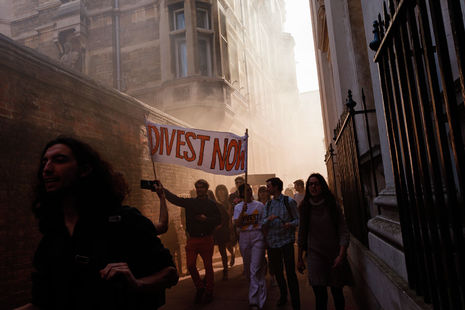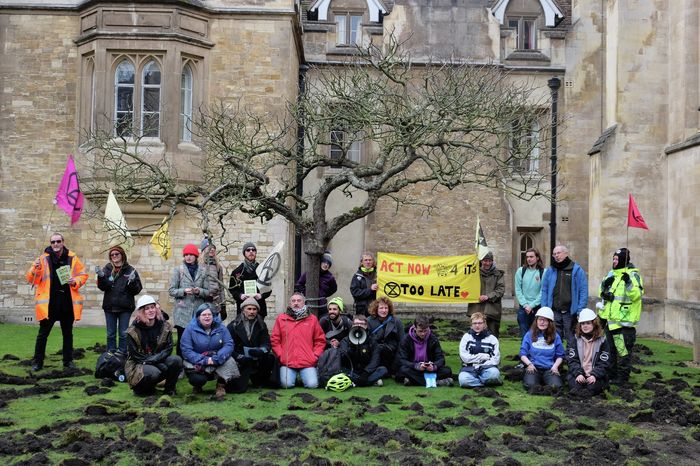Divestment update: four colleges announce partial divestment from fossil fuels
Divestment revelations come during Extinction Rebellion’s direct action campaign.

Newnham, Robinson, St John’s and Fitzwilliam have all publicly announced, for the first time, that they are partially divested from fossil fuels.
Partial divestment, according to Extinction Rebellion (XR), is when an institution holds “no direct investments in fossil fuels and has committed to never hold them again, but still holds indirect investments (investments through an intermediary investment fund) in them”.
According to this definition, King’s and Gonville & Caius, do not count as divested because while they hold no direct investments in fossil fuels, neither will rule out holding them in the future.
Darwin too, according to XR, are in the process of divesting but “for some reason...it will only tell its alumni if they specifically ask - it won’t admit to it publicly”.
A statement on St John’s website on 10th August says the College “divested from all direct fossil fuel investments in 2013 and has no intention of acquiring such direct investments in the future.”
On 7th August, Robinson also updated their website to say that “The College is aware that a number of our stakeholders have expressed an interest in our investment policy. The College holds no direct investments in fossil fuels and has no intention of so holding in the future.”
A spokesperson from Fitzwilliam confirmed that “since 2016, the College has not invested directly in fossil fuels, tobacco manufacturers, or weapons manufacturers.”
When asked whether there were plans to entirely divest in the future the spokesperson detailed that “the College believes that, when investing its funds, a high priority must be placed on promoting good standards of environmental, social, and governance (‘ESG’) behaviour...In recognition of conflict with its objectives and these wider principles, the College will not invest directly and will reasonably minimise indirect investments in: 1) producers of high impact fossil fuels (thermal coal, oil sands, shale oil and shale gas) 2) tobacco manufacturers 3) manufacturers of civilian firearms, controversial and nuclear weapons.”
The final College to announce their partial divestment from fossil fuel companies was Newnham, who updated their website on 7th August. According to a College spokesperson, Newnham “have been partially divested for several years”.
When asked whether the College was likely to entirely divest in the future the spokesperson continued: “we do not have any formal plans set out in writing, but in reality we have been reducing our indirect investments.”
Gonville and Caius is one of the two colleges to have partially divested with no commitment to remain divested in the future.
On 6th August, it was revealed on their website that one of the funds in which the College invests, COIF Charities Investment Fund, had “disposed of its remaining interests in extractive fossil fuel companies.”
Another fund, Partners Capital, on 30th June 2020 had £1.3 million worth of investments in fossil fuels. Half of these investments “are scheduled for imminent disposal.” However there was no commitment on the website to avoid holding direct investments in fossil fuels in the future.
The same is true of King’s, who updated their website on 12th August to confirm they do “not have any direct investments in the fossil fuel industry. The College's only holdings in the fossil fuel industry are through index funds, and we are currently exploring alternatives to these funds. We also hold environmentally positive investments, notably in Impax Environmental Markets.”
The revelations come in the wake of XR’s direct action campaign against non-divested colleges which started at the beginning of August. Although this direct action campaign did not influence any of the college’s decisions to divest, it is likely that it forced colleges to be more open with their investment policies.
On their website, XR celebrated the fact “colleges are publicly disclosing information on their investment practices that they never have before. Their positions on fossil fuels and the climate crisis is more transparent to anybody who cares to look and some colleges, importantly, have committed not to invest directly again - they publicly acknowledge that fossil fuels are bad and they are clearly saying they won’t profit from them.”
“These colleges have started to disavow the fossil fuel industry, removing its social legitimacy and making way for other colleges and the University to do the same and more.”
Before the campaign started only two colleges - Clare Hall and Queen’s - were known to be entirely divested, while a further five - Selwyn, Emmanuel, Downing, Peterhouse and Jesus - were known to be partially divested.
Darwin, King’s, Gonville & Caius, St John’s and Robinson were all contacted for comment.
 News / Colleges charge different rents for the same Castle Street accommodation2 March 2026
News / Colleges charge different rents for the same Castle Street accommodation2 March 2026 News / King’s hosts open iftar for Ramadan3 March 2026
News / King’s hosts open iftar for Ramadan3 March 2026 Theatre / Lunatics and leisure centres 4 March 2026
Theatre / Lunatics and leisure centres 4 March 2026 News / Angela Merkel among Cambridge honorary degree nominees27 February 2026
News / Angela Merkel among Cambridge honorary degree nominees27 February 2026 News / News in Brief: waterworks, wine woes, and workplace wins 1 March 2026
News / News in Brief: waterworks, wine woes, and workplace wins 1 March 2026








